No holiday for Port Adelaide: Victory in China takes a power of planning
A 14-hour flight, a pressurised cabin, different time zone, sleep, bugs, diet and humidity. The off-field battle to prepare players’ minds and bodies before game day in Shanghai.
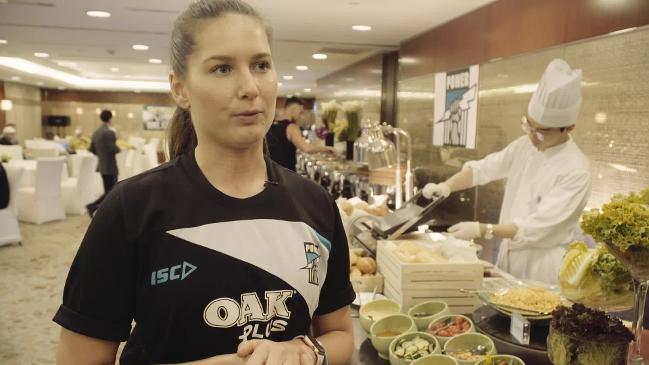
Port Adelaide
Don't miss out on the headlines from Port Adelaide. Followed categories will be added to My News.
- How ‘big-risk’ China gamble is paying off for Power
- Power hit rocky road in China
- AFL teams for Round 11
- No worry four Saint over ‘unlucky’ number
- Port ‘to breathe fire’, shake Power naps in China
“Ladies and gentlemen, the captain has turned on the fasten seat belt sign. If you haven’t already done so, please stow your carry-on luggage underneath the seat in front of you or in the overhead locker. Your portable electronic devices must be set to flight mode. We wish you all an enjoyable journey to … Launceston. Shanghai. Perth!”
It’s Tuesday night and a commercial aeroplane is filled with players and staff of the Port Adelaide Football Club making their way to China to take on St Kilda at Adelaide Arena at Jiangwan Stadium on Sunday afternoon.
What lies ahead of them is a 14-hour flight largely undertaken at night with a cabin pressurised to 1600m.
This is not a holiday. This is work.
And with the Power doing so much travel in a month: from Launceston last weekend to Shanghai this week, and then a trip to Perth following next weekend’s bye, precautions must be taken because there is a lot at stake. There are premiership points and a season on the line.
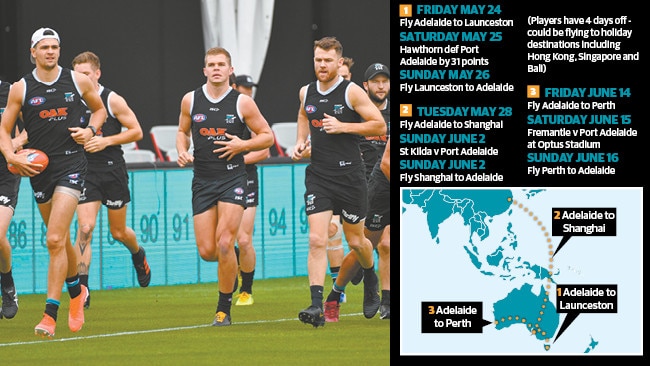
Exercise and sports scientist, Professor Jon Buckley, who specialises in athletic performance and recovery at UniSA says long distance travel has the potential to drastically impact an athlete’s performance.
“Depending on where they are going and how many time zones they cross, it can affect their circadian rhythms — or the normal daily cycles — and a person functions better when all these rhythms are aligned,” he explains.
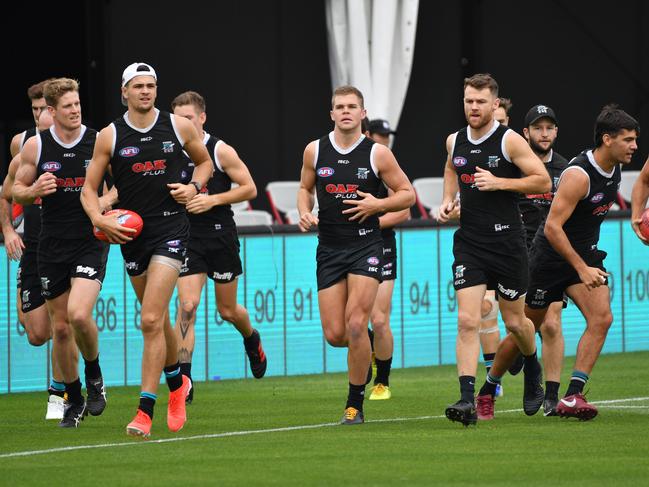
“So if you fly into night-time when it should be day … that disrupts these rhythms and you won’t perform optimally until they get back into synch.
“But for the trip to Shanghai, that’s not too big a deal. Shanghai is in the same time zone as Perth, so from Adelaide the players are only crossing into the next time zone.”
Prof Buckley points to a study from the early 2000s that followed Australian netballers as they crossing multiple timelines to play games.
He says it found that crossing just one time zone (from Melbourne to Adelaide) affected the team’s overall performance.
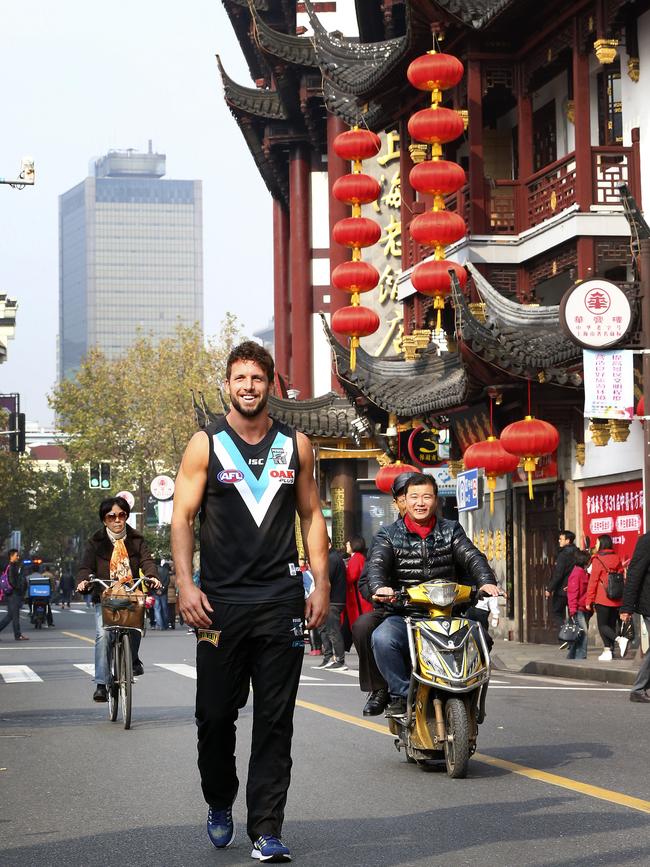
“(The researcher) looked at winning versus losing margins and if you crossed one time zone there was a four-goal disadvantage,” he says.
“We don’t know what the disadvantage is in football, but there’d be an advantage to Port because they don’t have to go as far.
“But if they were playing against Fremantle or West Coast who don’t have to change time zones, it would be an advantage for them.”
But, reiterates Prof Buckley, it’s not just about time zones. There’s also the length of the flight involved and a 14-hour flight to Shanghai in a northerly direction creates its own problems.
“The obvious one is sleep because it can sometimes be hard to sleep properly on a plane and if you don’t sleep well … it tends to affect cognitive performance and reaction times.
“(Secondly) airline cabins aren’t fully pressurised. On average, they’re pressurised to about 1600m, so it’s as if you’re at 1600m of altitude, not 10,000m.
“We know that as a result of that, they would be hypoxied so they’re blood won’t be fully saturated with oxygen.”
However, Prof Buckley believes this has all been mitigated by the fact Port Adelaide travelled to China early enough so they landed exactly four days before the game (they arrived lunchtime on Wednesday).
St Kilda, on the other hand left Melbourne on Thursday morning, arriving late Thursday evening: less than three full days before the game.
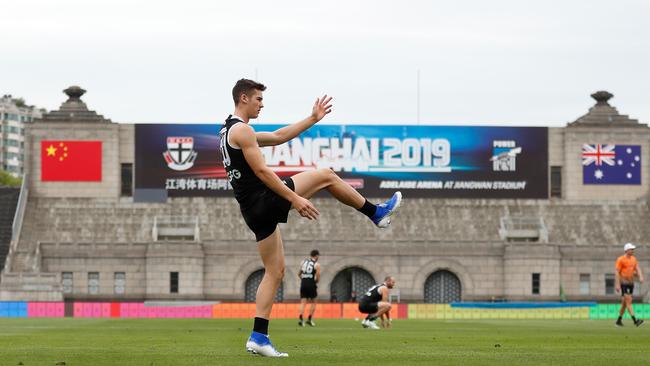
“Port would have an advantage in arriving earlier,” he says.
“That will allow them more time to recover from the time difference, and the flight and get used to the local conditions.
“They have also played there before so many of the players will be more familiar with not only the local (weather) conditions, but also the ground.
“This familiarity with being there should help them settle in better and be able to focus more on the game ahead.”
In Prof Buckley’s opinion Port Adelaide has been smart in this planning: they book the same hotel, hold the same training sessions as they would back home and ensure routines stick.
However, there is one thing that St Kilda has done differently to Port that could give them an edge in the game: they’ve been holding boxing and yoga sessions in a heat studio in a bid to prepare for hot conditions in Shanghai.
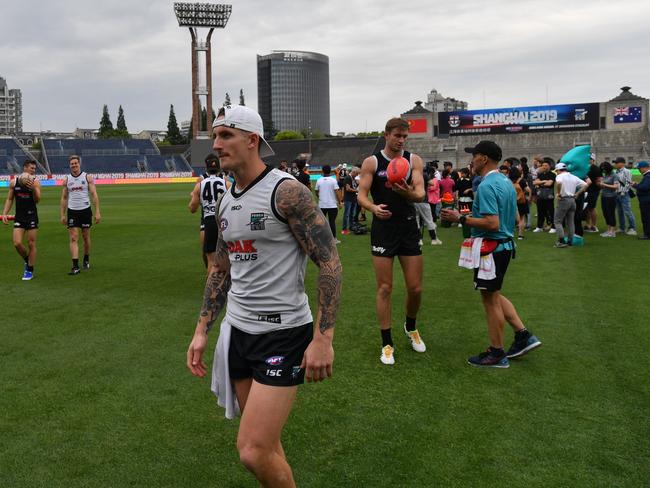
“St Kilda doing heat acclimation was smart as heat and humidity can take a toll on performance because you need to direct more blood to the skin to cool, which means less is available for muscle, which impairs performance,” Prof Buckley says.
“Training in the heat increases blood volume and improves sweating, so this results in more blood available for the muscle so less reduction in performance. How much of a reduction in performance would occur due to the conditions in Shanghai is difficult to predict, but it would have an effect if the Power players have not also been acclimatising using heat training.
“I do not expect it will be a large effect, though as it is not going to be extremely hot and humid and they can use strategies to counter the effects if it is having an impact (for example ice vests), but the forecast is not looking too extreme, so they most likely won’t need that in 27C with 67 per cent humidity.”
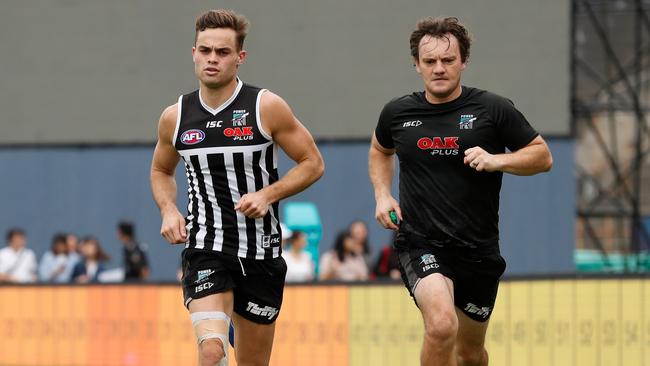
There are other considerations of so much travel: the flu is going around and reticulated air in planes comes with the risk of picking up bugs. Keeping a regulated diet can be more difficult (particularly in a foreign country). Planes can dehydrate the body. Taller athletes can struggle with the leg room.
But for all of that, Prof Buckley is tipping Port for this Sunday’s clash.
“Their familiarity with the environment when they arrive will help them settle in and be able to focus on the game rather than a lot of new things around them, they got there earlier so have more time to recover from the flight, and the temperature is not going to be extreme,” he says.
“Hopefully nobody picked up any infections on the flight and they have been careful about what they eat and drink.”


